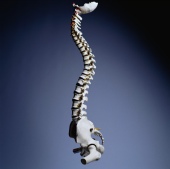Increase in physical activity and weight loss for many obese patients with LSS
THURSDAY, March 26, 2015 (HealthDay News) — For obese patients with lumbar spinal stenosis (LSS), an e-health intervention is feasible and effective for increasing physical activity and decreasing fat mass, according to a study published in the April 1 issue of The Spine Journal.
Christy C. Tomkins-Lane, Ph.D., from Mount Royal University in Calgary, Canada, and colleagues developed and piloted an e-health intervention aimed at increasing physical activity for individuals with LSS. Participants included 10 overweight or obese individuals with LSS. As part of the e-health intervention, participants received a pedometer and personalized consultation with a dietician and exercise physiologist. Participants logged on to the e-heath website for 12 weeks to access personal goals, nutrition education videos, and a discussion board.
The researchers observed significant improvements for fat mass, trunk fat mass, symptom severity, energy intake, maximum continuous activity, and mental health (P < 0.05). In addition, there were nonsignificant improvements noted in waist circumference, pain, Oswestry Disability Index, and biomarkers of obesity. Overall, 75 percent of participants lost weight, walking capacity was improved in 50 percent of participants, and 60 percent reported increased quality of life. There was a 15 percent mean increase in steps.
“This intervention provides people with LSS the opportunity to participate in their own health management, potentially improving access to care,” the authors write. “Efficacy is currently being assessed in a randomized trial.”
Copyright © 2015 HealthDay. All rights reserved.








